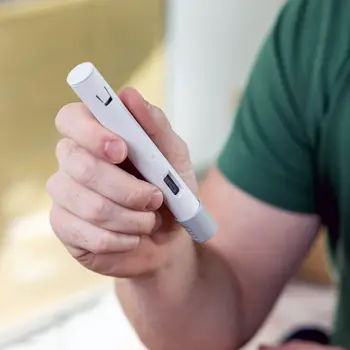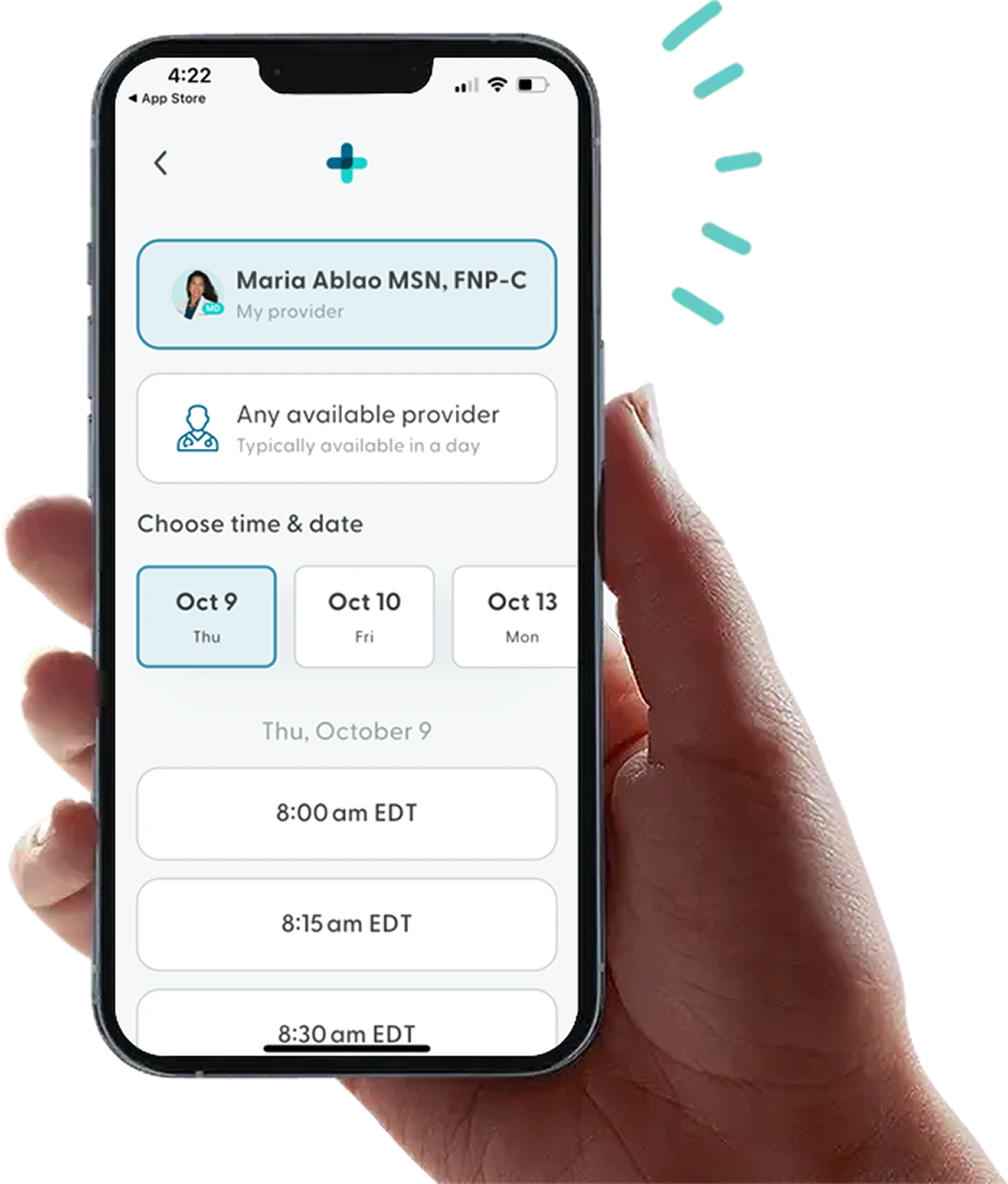Autophagy Fasting: What You Need to Know Before Starting
One of the most significant benefits of fasting is its ability to kickstart an important cellular process called autophagy.
Not only is autophagy essential for maintaining overall health, it’s also crucial for helping cells function optimally.
Understanding how this process works and what you can do to activate it is important for making healthy lifestyle choices.
We’ll discuss everything you need to know about autophagy, and provide a list of best practices you can implement to safely initiate it.
Get prescription weight loss medication online.
Find out if you're eligible for GLP-1s, and get started on your weight loss journey for as low as $75/month.


What is Autophagy?
Autophagy is a biological process that plays a fundamental role in maintaining the overall health of the body’s cells.
It can be thought of as the body’s recycling system that replaces and repairs damaged components. This helps to ensure that all cells remain in optimal functioning condition.
When cells are constantly refreshed through autophagy, the body can conserve the energy it would normally use to generate new cells.
Autophagy also allows healthy cells to better adapt to external stressors, such as nutrient deprivation, infections, or DNA damage.
This keeps the body protected from neurodegenerative disorders, metabolic syndromes, and diseases like cancer.
Why Should You Fast for Autophagy Induction?
Inducing autophagy can have a number of potential benefits that can improve your overall well-being.
Reduced risk of chronic diseases
Autophagy has been associated with a reduced risk of chronic health issues, including heart disease, diabetes, and cancer.
By eliminating damaged components and maintaining cellular health, autophagy may help you prevent these conditions from developing.
Autophagy has also shown potential for preventing diseases such as Alzheimer's, Parkinson's, and Huntington's disease.
These diseases are characterized by the accumulation of toxic protein aggregates within neurons, which autophagy can help remove.
Key Point: How Does Autophagy Prevent Neurodegenerative Diseases?
In neurodegenerative diseases, misfolded proteins accumulate and disrupt normal cellular functions.
Autophagy plays a crucial role in identifying and removing these misfolded proteins, preventing their toxic buildup. It can also replace these proteins with healthier cells.
By promoting efficient protein turnover and maintaining the overall health of neurons, autophagy may mitigate the impact of neurodegenerative conditions and potentially delay their onset.
Enhanced immune function
Autophagy plays a critical role in immune system function by clearing pathogens and helping the body to create and deliver antibodies to cells.
A properly functioning autophagy process can also enhance the immune system's ability to defend against infections and diseases.
How Does Fasting Impact Autophagy?
Fasting is a dietary method that focuses on time-restricted eating (TRE), which entails limiting your food intake to specific time periods during the day.
Prolonged fasting has been found to have a significant impact on autophagy because it acts as a natural stimulant. It can trigger autophagy in a few different ways:
Reduced nutrient availability: During fasting, the body experiences a significant reduction in nutrient intake, which can activate autophagy. When the usual sources of energy and cellular building blocks are limited, the body uses autophagy to recycle and repurpose cell components to meet its needs.
Changes in hormonal signaling: Fasting influences hormonal signaling pathways involving insulin and glucagon. During fasting, insulin levels drop, and glucagon levels rise. This shift in the hormone balance may cause the body to switch from storing energy to utilizing it. When this happens, autophagy occurs.
Energy conservation: When you fast, you deliberately withhold food from the body. This causes the body to go into a “survival mode”, which allows it to conserve energy. Autophagy is crucial for this conservation since it breaks down and recycles cellular components to generate energy. This ensures that cells have the necessary resources to maintain essential functions.
The Best Fasting Strategies to Achieve Autophagy
Implementing fasting helps to naturally prompt the body to initiate autophagy. Let’s take a look at some effective fasting methods that can induce this process.
Intermittent fasting (IF)
Intermittent fasting involves cycling between periods of eating and fasting.
The most common forms of IF include:
The 16/8 method, which involves fasting for 16 hours and eating within an 8-hour window.
The 5:2 diet, which involves eating normally for five days and restricting calorie intake on two nonconsecutive days.
Extended fasting
Extended fasting typically involves fasting for longer periods, ranging from 24 hours to several days. A popular example is the 24-hour fast, where you abstain from food for a full day.
This type of fasting may also last 48 hours, 72 hours, or longer, and it requires careful planning and supervision.
Extended fasting is not recommended for people who are just starting out with this dietary approach or with medical conditions like diabetes, as it may be too harsh on their bodies.
Ready to achieve your weight loss goals?
Shed pounds with GLP-1 medication prescribed online by licensed healthcare providers for as low as $75/month.


Key Point: How Long Should You Fast to Induce Autophagy?
The duration of fasting required to initiate significant autophagic responses can vary and depends on factors like diet, metabolic rate, and overall health. Below are some general guidelines that may be helpful:
-
Short-term activation: Shorter fasting durations — such as 12 to 16 hours — can stimulate a moderate level of autophagy over a short period of time. This level of autophagy may help with routine cellular maintenance and contribute to overall health.
-
Moderate activation: Extended fasts of 24 to 48 hours are more likely to induce a longer-term moderate autophagic response. During these fasting periods, the body begins relying on autophagy for energy and cellular repair.
-
Significant activation: For a more sustained autophagic response, extended fasts exceeding 48 hours may be necessary. During these extended periods, autophagy preserves cellular function and promotes the breakdown of damaged components.
Balancing Autophagy Nutrient Intake
While fasting can be a valuable tool for activating autophagy and promoting cellular health, it’s important to know that it may not be a suitable dietary approach for everyone.
It’s also essential to prioritize following a balanced diet when implementing fasting to avoid factors like nutrient deficiencies and metabolic diseases.
Your diet should include nutrient-dense foods like fruits and vegetables, lean proteins, and whole grains that support your well-being.
Prolonged nutrient deprivation can also lead to muscle loss and hormonal imbalances, which can have a negative effect on your overall health.
Tips for supporting autophagy beyond fasting
There are a few different ways to initiate autophagy besides fasting. These include:
Getting enough regular physical activity: Incorporate regular physical activity into your routine to support cellular health. Exercise — particularly resistance training — helps stimulate autophagy and also helps to preserve muscle mass. We’ll discuss this in more detail in the next section.
Drinking enough water: Proper hydration is essential for cellular processes, including autophagy. Drink plenty of water throughout the day to support healthy cell functioning. Read on to learn more about how hydration can have a positive effect on autophagy.
Practicing stress management techniques: Chronic stress can interfere with autophagy. Use stress-reduction techniques like meditation, deep breathing, or yoga to promote cellular resilience.
Getting enough sleep: Quality sleep is essential for autophagy and overall health. Aim for 7-9 hours of restful sleep each night to enhance the body’s cellular repair processes.
Factors That Influence Autophagy When Fasting
Autophagy during fasting can be influenced by several factors. These may vary from person to person but generally include:
Age: Autophagy tends to decline with age because cells become less responsive to biological signals. Younger individuals may experience prolonged autophagic responses during fasting compared to older individuals.
Genetics: Genetic factors can play a role in enhancing or inhibiting autophagy. Some people may have genetic variations that increase or reduce the effectiveness of autophagy during fasting.
Overall health: Chronic health conditions — such as diabetes or obesity — may interfere with autophagic processes. Many of these diseases cause insulin resistance, which impairs the body’s response to autophagy and reduces its effectiveness.
Hormonal balance: Hormones — particularly insulin and glucagon — play key roles in regulating autophagy. Insulin inhibits autophagy, while glucagon promotes it. Individuals with hormonal imbalances may experience differences in their autophagic responses during fasting.
What is the impact of exercise and hydration on autophagy fasting?
Exercises like resistance training and HIIT create cellular stress and energy demands. This stress triggers autophagy as a response to repair and adapt to it.
When combined with fasting, exercise can further enhance autophagy.
Fasting prepares the body for cellular repair, and exercise can amplify this process. Over time, this can promote more efficient autophagy.
Proper hydration is also essential for autophagy to function optimally.
Dehydration can disrupt cellular processes, so drinking enough water helps to keep these processes functioning as they should.
Adequate hydration can also help the body transport cellular waste products to membranes called lysosomes. These membranes break down waste and help cells to operate efficiently.
Should You See a Doctor About Autophagy Fasting?
Before implementing autophagy fasting, it's recommended to speak to a healthcare professional.
Individuals who have underlying health conditions, are taking medications, or are pregnant or breastfeeding should also speak to their doctor first.
A doctor can assess your individual needs and provide guidance on whether fasting is safe and appropriate for you.
Even if you're in good health, a general health assessment can help identify potential risks, allowing you to choose the most suitable fasting approach.
Monitoring your well-being during fasting and seeking medical attention if you experience concerning symptoms is also essential for ensuring your safety.
Where Can You Learn More About Autophagy and Fasting?
If you’re concerned about your eating habits or want to know more about strategies like autophagy, fasting, and weight management LifeMD is here to help.
LifeMD can connect you with a team of licensed medical professionals who can assist you with information and provide guidance on how to safely implement autophagy strategies — all from the comfort of your home.
Make an appointment today to learn more about fasting and how LifeMD can help you live a healthier life.
More articles like this
Feel better with LifeMD.
Your doctor is online and ready to see you.
Join LifeMD for seamless, personalized care — combining expert medical guidance, convenient prescriptions, and 24/7 virtual access to urgent and primary care.

GLP-1
Zepbound® Wegovy® Saxenda®
This is it! Be part of the weight loss movement everyone’s talking about.
Get Started Now
 Medically reviewed and edited by
Medically reviewed and edited by 








